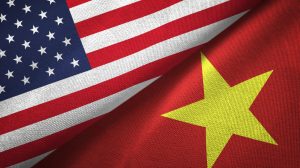U.S. President Joe Biden will make a one-day state visit to Vietnam on September 10, when he and his Vietnamese hosts are expected to announce an upgrade to their diplomatic relationship.
The date was announced yesterday in a statement by Biden’s Press Secretary Karine Jean-Pierre, who said that the president will meet with Nguyen Phu Trong, the general secretary of the Communist Party of Vietnam, and other leaders and “discuss ways to further deepen cooperation between the United States and Vietnam.”
It added that the leaders will also “explore opportunities to promote the growth of a technology-focused and innovation-driven Vietnamese economy, expand our people-to-people ties through education exchanges and workforce development programs, combat climate change, and increase peace, prosperity, and stability in the region.” Biden will then depart for Alaska, where he will take part in a commemoration of the 9/11 attacks.
While Jean-Pierre made no mention of it, Biden’s visit is expected to see the two nations announce a “strategic partnership,” an upgrade on the current “comprehensive partnership.”
Biden himself has on two recent occasions made references to a possible upgrade in relations with Vietnam, which has been a goal of the U.S. for a number of years. This year, U.S. officials have been particularly outspoken about the desire to upgrade the relationship from the “comprehensive partnership,” established in 2013, which sits at the bottom of Vietnam’s three-tier diplomatic taxonomy, to a “strategic” partnership. During his visit to Vietnam in April, Secretary of State Antony Blinken, said that an elevation of formal ties could occur “in the weeks and months ahead.”
The vagueness of Biden’s past remarks has even led to unfounded reports that the two nations might leapfrog the strategic relationship and announce a “comprehensive strategic partnership” – the top tier of Vietnam’s diplomatic taxonomy. Hanoi currently only has comprehensive partnerships with China, Russia, India, and South Korea.
An upgrade would represent a milestone in the relationship between Hanoi and Washington, which has grown tremendously over the past two decades. As I’ve noted before, an upgrade would mostly harmonize the outward form of the two nations’ relationship with the substance. While the boundaries between the various diplomatic designations are vague and porous, one U.S. official with knowledge of the negotiations told Politico last week that the upgrade “will allow for new bilateral collaboration that will boost Vietnam’s efforts to develop its high technology sector in areas including semiconductor production, and artificial intelligence.”
While it might be motivated in part by concerns about China, particularly its recent assertive actions in the South China Sea, an upgrade in relations with the U.S. would very much conform to the foreign policy that the country has pursued for the past two decades. This is based on building close relations with as many major outside powers as possible, in order to ameliorate its awkward strategic location on China’s southern flank.
It would also be just one of a number of upgrades that Vietnam has brokered or is considering in the near future. During this week’s state visit to Vietnam by Singapore’s Prime Minister Lee Hsien Loong, the two nations said that they are considering the elevation of their relationship to the “comprehensive strategic” level, and Vietnam has also just committed to doing so with Australia.

































